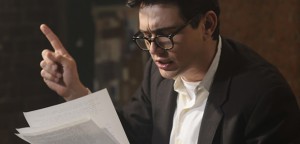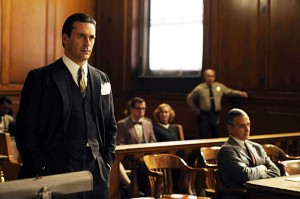Howl
 Recently I interviewed Noah Buschel, the director of The Missing Person, on the various ways the independent film world works and how it has changed over the past ten years. Noah would know better than most about this subject, because he made three films in three different eras of independent films, always having to change his approach to selling the film to potential financiers and eventually getting distribution (or not). One of his films was Neal Cassady, a fractured biopic about the titular figure who was the inspiration for Jack Kerouac’s Dean Moriarty character in On the Road. Not knowing much about that era of writing, or beatniks, or Ken Kesey (author of One Flew Over the Cuckoo’s Nest), I was going into Neal Cassady practically blind on the subject matter. And to Noah’s credit he did not dumb his movie down for the mass audience. As a result, I had no idea what was going on for most of the 80 minute film, as there’s no really no in for an outside party, and I complimented him on sticking to his guns and making a movie I had no way of understanding.
Recently I interviewed Noah Buschel, the director of The Missing Person, on the various ways the independent film world works and how it has changed over the past ten years. Noah would know better than most about this subject, because he made three films in three different eras of independent films, always having to change his approach to selling the film to potential financiers and eventually getting distribution (or not). One of his films was Neal Cassady, a fractured biopic about the titular figure who was the inspiration for Jack Kerouac’s Dean Moriarty character in On the Road. Not knowing much about that era of writing, or beatniks, or Ken Kesey (author of One Flew Over the Cuckoo’s Nest), I was going into Neal Cassady practically blind on the subject matter. And to Noah’s credit he did not dumb his movie down for the mass audience. As a result, I had no idea what was going on for most of the 80 minute film, as there’s no really no in for an outside party, and I complimented him on sticking to his guns and making a movie I had no way of understanding.
Rob Epstein and Jeffrey Friedman’s Howl about Allen Ginsberg’s controversial poem that became the subject of an obscenity trial, threatened to leave me in a similarly excluded lurch. Ginsberg was both inspired by and was a lover of Cassady, and as with Kerouac, Ginsberg employed a rambling, self-indulgent style of writing. Whether you identify with his themes of anger, confusion, and bottled up sexuality is helpful to your potential enjoyment of Howl, but the movie is made in such a way as to alienate both fans of Ginsberg and those who are novices of beat poetry.
 Friedman and Epstein (who made The Times of Harvey Milk on his own and The Celluloid Closet and Common Threads with Friedman) had intended to make a documentary on the trial but couldn’t find enough footage to justify a feature. So, instead of making a short subject, they were forced to cobble together an 85 minute mix of staged court footage and Ginsberg, played by James Franco, explaining the origins of Howl¸ accompanied by computer generated animation (a typewriter morphs into a jazz musician) to further break down the sexual imagery (“alcohol, cock, and endless balls”). The scenes in court are stiff and have no power, not helped by the overqualified actors playing lawyers (David Straithairn as the DA, Jon Hamm as the defense attorney, Bob Balaban as the judge) and witnesses with literary pedigrees (Jeff Daniels, Treat Williams, Mary Louise-Parker) in glorified walk-ons, and especially because the public context of the obscenity trial isn’t explored. We never know how this trial affected any writer or politician outside of those in the courtroom or how obscenity laws and trials changed because of it. It’s funny that one of the interpretations that are harped on is, “literary value sometimes is a book which will survive any test of time,” and yet the movie doesn’t evaluate its own subject in that manner.
Friedman and Epstein (who made The Times of Harvey Milk on his own and The Celluloid Closet and Common Threads with Friedman) had intended to make a documentary on the trial but couldn’t find enough footage to justify a feature. So, instead of making a short subject, they were forced to cobble together an 85 minute mix of staged court footage and Ginsberg, played by James Franco, explaining the origins of Howl¸ accompanied by computer generated animation (a typewriter morphs into a jazz musician) to further break down the sexual imagery (“alcohol, cock, and endless balls”). The scenes in court are stiff and have no power, not helped by the overqualified actors playing lawyers (David Straithairn as the DA, Jon Hamm as the defense attorney, Bob Balaban as the judge) and witnesses with literary pedigrees (Jeff Daniels, Treat Williams, Mary Louise-Parker) in glorified walk-ons, and especially because the public context of the obscenity trial isn’t explored. We never know how this trial affected any writer or politician outside of those in the courtroom or how obscenity laws and trials changed because of it. It’s funny that one of the interpretations that are harped on is, “literary value sometimes is a book which will survive any test of time,” and yet the movie doesn’t evaluate its own subject in that manner.
 And since these scenes in the courtroom are limited to the lawyers asking a question and the witnesses simply reciting their personal analysis of Howl, the movie turns into a cliff notes version of the poem. Franco’s performance, which considering the photos of Ginsberg shown throughout the film, isn’t nebbishy enough, except for his attempt to play the part as if he were doing a half-hearted impression of Jeff Goldblum (Flight of the Conchords’ Jemaine Clement would be best suited for the role, since Goldblum is now a bit too old for the part). It’s not that Franco has much to do anyway; he’s either on stage reading his poem, or explaining it to an unseen reporter. There’s no deliberate irony in this choice either, despite the fact that the entire trial appears to be based on the objection to individual words and profanities, intending to remove them from their context. Did Friedman and Epstein not notice that by having Franco reveal the meaning of each word and phrase, they’re just as bad as the district attorney who filed the case?
And since these scenes in the courtroom are limited to the lawyers asking a question and the witnesses simply reciting their personal analysis of Howl, the movie turns into a cliff notes version of the poem. Franco’s performance, which considering the photos of Ginsberg shown throughout the film, isn’t nebbishy enough, except for his attempt to play the part as if he were doing a half-hearted impression of Jeff Goldblum (Flight of the Conchords’ Jemaine Clement would be best suited for the role, since Goldblum is now a bit too old for the part). It’s not that Franco has much to do anyway; he’s either on stage reading his poem, or explaining it to an unseen reporter. There’s no deliberate irony in this choice either, despite the fact that the entire trial appears to be based on the objection to individual words and profanities, intending to remove them from their context. Did Friedman and Epstein not notice that by having Franco reveal the meaning of each word and phrase, they’re just as bad as the district attorney who filed the case?
 There are issues that could have been explored other than the time-honored “what is obscenity?”, such as Straithairn’s specious argument that if you don’t understand the meaning of something, it must be obscene or how the entire notion of determining public decency is based on protecting a theoretical person. It’s a condescending notion that still goes on today (“I don’t find it racist/homophobic/xenophobic, but the public might”), but in Howl, it turns out it’s just a legal device, not intended as anything other than a transparent attempt to sway the judge in absence of real evidence. And since the judge ignores it, why exactly should I care?
There are issues that could have been explored other than the time-honored “what is obscenity?”, such as Straithairn’s specious argument that if you don’t understand the meaning of something, it must be obscene or how the entire notion of determining public decency is based on protecting a theoretical person. It’s a condescending notion that still goes on today (“I don’t find it racist/homophobic/xenophobic, but the public might”), but in Howl, it turns out it’s just a legal device, not intended as anything other than a transparent attempt to sway the judge in absence of real evidence. And since the judge ignores it, why exactly should I care?
Viewed as part of the 2010 Philadelphia QFest.




Tweets that mention Howl | A Regrettable Moment of Sincerity -- Topsy.com says:
September 12th, 2010
5:10 am
[…] This post was mentioned on Twitter by Stephen Croke, Adam Lippe. Adam Lippe said: A review of Howl http://www.regrettablesincerity.com/?p=5822 […]